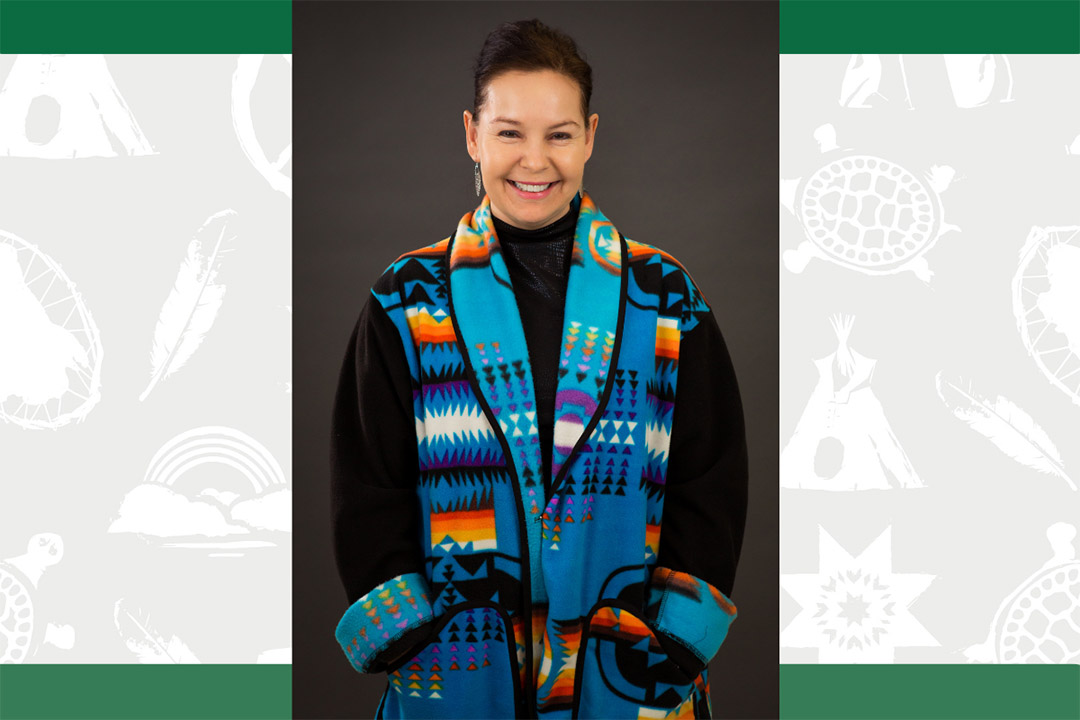
Canadian nursing schools make Indigenous training part of curriculum
Indigenous Research Chair in Nursing Dr. Holly Graham of the University of Saskatchewan (USask) collaborates with Canadian Association of Schools of Nursing to offer a series of five virtual workshops.
By Paul SinkewiczWhen graduating nurses accept their degrees at universities and colleges across Canada in the future, it will be with a deeper understanding of the history of colonialism in Canada.
And when they begin their work at the bedside, caring for patients of Indigenous heritage, it will be with a better appreciation for their culture and needs, and with more sensitivity to racism.
This is thanks to the work of Dr. Holly Graham and the other five Chairs of Indigenous Health in Nursing in the country. They are collaborating with the Canadian Association of Schools of Nursing (CASN) to offer a series of five virtual workshops to CASN member schools. The topics are: Anti-Indigenous Racism, Cultural Humility, Cultural Safety, History of Indigenous Peoples, and Implementing Call to Action #24.
Dr. Graham and the other Chairs were also part of a review and revision of CASN’s Accreditation Guidelines for baccalaureate, nurse practitioner, and practical nurse education programs, which resulted in the inclusion of a standard requiring schools of nursing to implement the Truth and Reconciliation Call to Action 24 in each of these programs across Canada.
Call No. 24 says: “We call upon medical and nursing schools in Canada to require all students to take a course dealing with Aboriginal health issues, including the history and legacy of residential schools, the United Nations Declaration on the Rights of Indigenous Peoples, Treaties and Aboriginal rights, and Indigenous teachings and practices. This will require skills-based training in intercultural competency, conflict resolution, human rights, and anti-racism.”
The Truth and Reconciliation Workshop Series for Nursing Faculty will assist schools of nursing in its implementation.
“After I took a graduate class taught by Dr. Verna St. Denis, an expert in Anti-Racist education, I had always said if I had the opportunity, I would bring anti-racist education into the nursing profession,” said Dr. Graham. “So, when I was awarded the Indigenous Research Chair, that was one of the first things I started to do as part of reconciliation and supporting mentorship.”
Dr. Graham is an associate professor at the College of Nursing at USask, and a Registered Doctoral Psychologist. She became a nurse in 1985 and worked in northern communities before returning to school for further degrees.
“I’m very excited that nursing schools are going to be required to respond to call No. 24 of the TRC Calls to Action, because that will ensure all nursing students will receive this content as part of their education.”
Dr. Graham said it gives her hope that all future nurses will be educated to understand the country’s colonial history and understand the context in which Indigenous health has emerged.
She said health disparities between Indigenous and non-Indigenous peoples are a result of colonization and the continued processes and policies that are in place.
“And I think when people understand we’ve all inherited this history and understand that we have come to view people in different ways depending on how we’ve been educated, we can start to unlearn that behaviour and move toward equitable care for everyone,” she said.
Prior to the launch of the workshop series, Dr. Graham along with a group of Indigenous nurses had started an online Indigenous Nursing Professional Practice Group (PPG) whose goal is to educate, collaborate, and enable all Saskatchewan nurses to work together to address current health disparities between Indigenous and non-Indigenous peoples, and to facilitate a platform for direct communication between the College of Registered Nurses of Saskatchewan (CRNS) and the Indigenous nurses in this province.
The group is called kā-wīci-pimohtēmāt (pronounced: gaah-weechi-bimohte-maat) PPG, which is a Cree word that translates to a person who walks with others in their journey.
“Part of my plan when I received the Chair was to lobby for policy change, which we have now successfully done,” said Dr. Graham. “And my plan was also to work with the College of Registered Nurses of Saskatchewan to find a platform for Indigenous nurses to communicate with each other and with CRNS, and to provide some resources for education, and this led to the website being developed.”
The website has different categories and an abundance of literature and resources.
“The CRNS has been very supportive throughout the process of creating the Indigenous PPG and have encouraged all nursing membership to utilize the resources and will count time spent on this website toward continuing education credits,” said Graham.
She said this new resource will be a key support to undergraduate nursing students, graduate students and nurses in the profession to connect, collaborate, and work together to improve Indigenous health and wellness.
Visit the website at: https://indigenousnursesppg.ca/
The other Chairs of Indigenous Health in Nursing who worked with Dr. Holly Graham are:
- BC Lisa Bourque-Bearskin PhD, RN
- MN Wanda Phillips-Beck, PhD, RN
- QC Amelie Blanchet-Garneau, PhD, RN
- NS Margot Latimer, PhD, RN
- NB Jason Hickey, PhD, RN
The Chairs are funded by the Canadian Institutes of Health Research, and made possible thanks to the sponsorship of the Institute of Indigenous Peoples' Health (IIPH), the Institute of Gender and Health (IGH) and the Canadian Nurses Foundation (CNF), in partnership with First Nations Health Authority (FNHA), Fonds de la recherche du Quebec — Santé (FRQS), Research Manitoba, New Brunswick Health Research Foundation (NBHRF), Nova Scotia Health Research Foundation (NSHRF) and Saskatchewan Health Research Foundation (SHRF).
Article re-posted on .
View original article.

